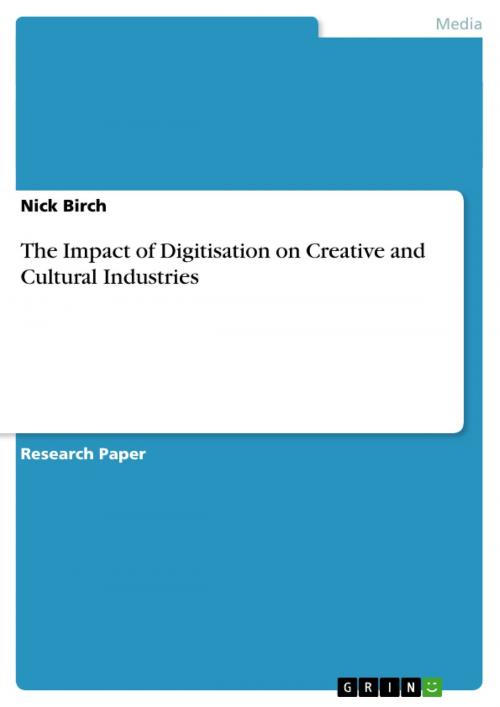The Impact of Digitisation on Creative and Cultural Industries
Nonfiction, Reference & Language, Language Arts, Communication| Author: | Nick Birch | ISBN: | 9783656608134 |
| Publisher: | GRIN Verlag | Publication: | March 4, 2014 |
| Imprint: | GRIN Verlag | Language: | English |
| Author: | Nick Birch |
| ISBN: | 9783656608134 |
| Publisher: | GRIN Verlag |
| Publication: | March 4, 2014 |
| Imprint: | GRIN Verlag |
| Language: | English |
Research Paper (postgraduate) from the year 2011 in the subject Communications - Miscellaneous, grade: 1.5, Central Queensland University, course: Creative Arts Administration, language: English, abstract: Digitization has impacted the creative arts since its inception and has even driven most sectors to where they stand today. Digitization is the conversion of information to a digital or binary format so that it may be processed by a computing device, making it easier to access, share and preserve (Whatis, N/A). The digitization of information enriches its quality, has made it possible to store in compact forms and enables it to be shared instantly. Advertising can more easily reach the masses and digital selves borderline immortality. Advancements in technology have seen the entertainment industry thrive in spite of also causing damage to sales. Computer Generated Imagery (CGI) has ushered in a new era of deception, warping reality and even creating new ones. In filmmaking, the line between imagination and reality has all but disappeared. Advertising can at times create controversy over what is an acceptable level of illusion. Even when informed, however, our vulnerability to accepting distorted realities seems to endure.
Nick Birch is a Media Production Professional with a Masters of Creative Enterprise. He has been working in the creative industries since 2000: mainly as an editor for local and international television series, commercials, documentaries, short films, corporate projects and music videos. He also produces, directs, shoots, sound-designs and writes. His extensive experience and natural affinity with clients and their vision makes him a favourite to work with, seeing the return of many satisfied customers. He has worked with TV networks, Hollywood producers, radio stations, mining magnates, airlines, actors, singers, dancers, lawyers, charities, designers, construction, children, animals, sports, tourism and even a volcanologist. He believes in balance, loyalty, freedom, humour and truth-values which permeate his livelihood. His enterprise is to make your story rise and shine in the most admirable, genuine, spectacular and engaging style possible. You can see some of his work at nickbirchstudio.com
Research Paper (postgraduate) from the year 2011 in the subject Communications - Miscellaneous, grade: 1.5, Central Queensland University, course: Creative Arts Administration, language: English, abstract: Digitization has impacted the creative arts since its inception and has even driven most sectors to where they stand today. Digitization is the conversion of information to a digital or binary format so that it may be processed by a computing device, making it easier to access, share and preserve (Whatis, N/A). The digitization of information enriches its quality, has made it possible to store in compact forms and enables it to be shared instantly. Advertising can more easily reach the masses and digital selves borderline immortality. Advancements in technology have seen the entertainment industry thrive in spite of also causing damage to sales. Computer Generated Imagery (CGI) has ushered in a new era of deception, warping reality and even creating new ones. In filmmaking, the line between imagination and reality has all but disappeared. Advertising can at times create controversy over what is an acceptable level of illusion. Even when informed, however, our vulnerability to accepting distorted realities seems to endure.
Nick Birch is a Media Production Professional with a Masters of Creative Enterprise. He has been working in the creative industries since 2000: mainly as an editor for local and international television series, commercials, documentaries, short films, corporate projects and music videos. He also produces, directs, shoots, sound-designs and writes. His extensive experience and natural affinity with clients and their vision makes him a favourite to work with, seeing the return of many satisfied customers. He has worked with TV networks, Hollywood producers, radio stations, mining magnates, airlines, actors, singers, dancers, lawyers, charities, designers, construction, children, animals, sports, tourism and even a volcanologist. He believes in balance, loyalty, freedom, humour and truth-values which permeate his livelihood. His enterprise is to make your story rise and shine in the most admirable, genuine, spectacular and engaging style possible. You can see some of his work at nickbirchstudio.com















